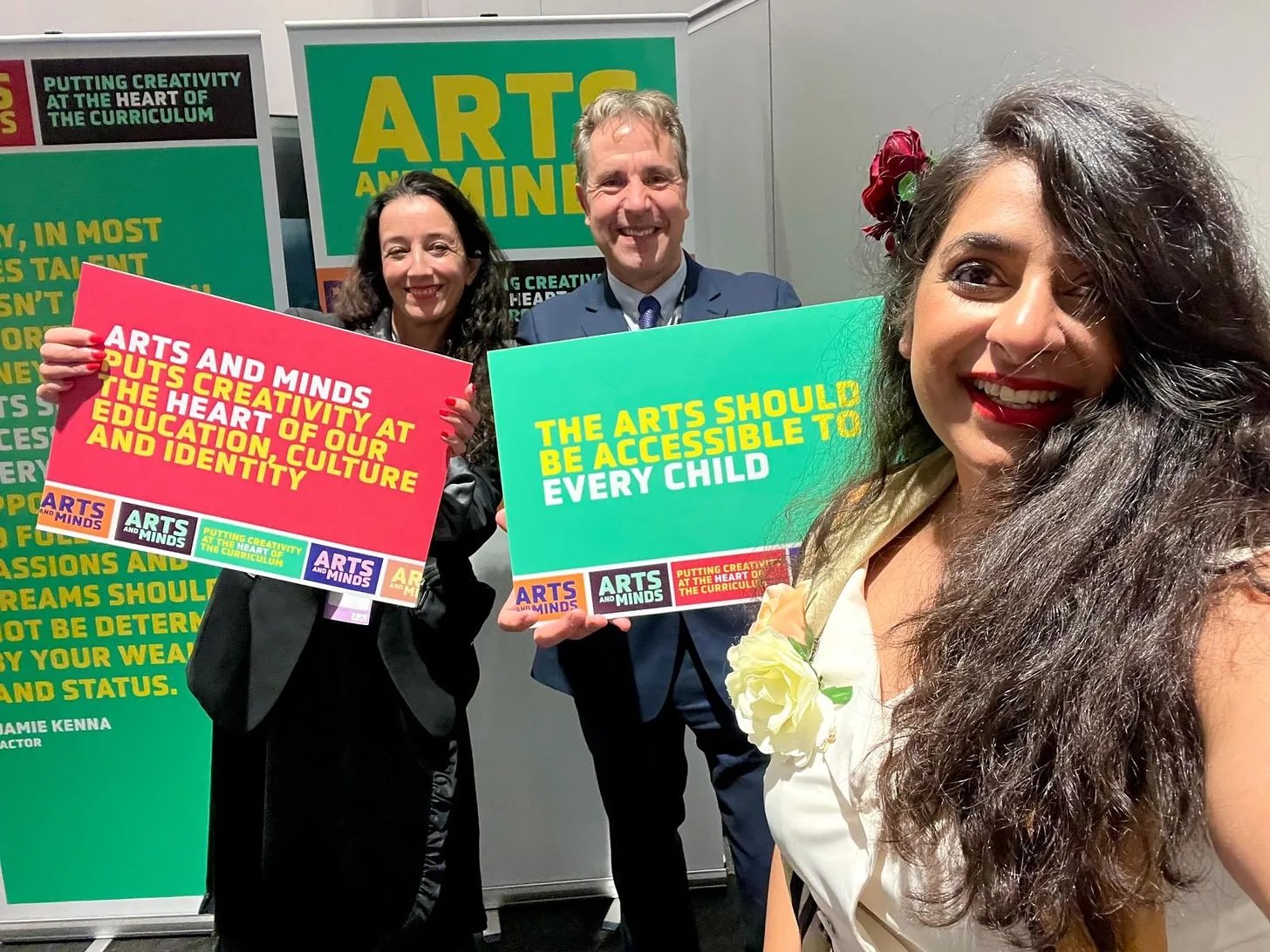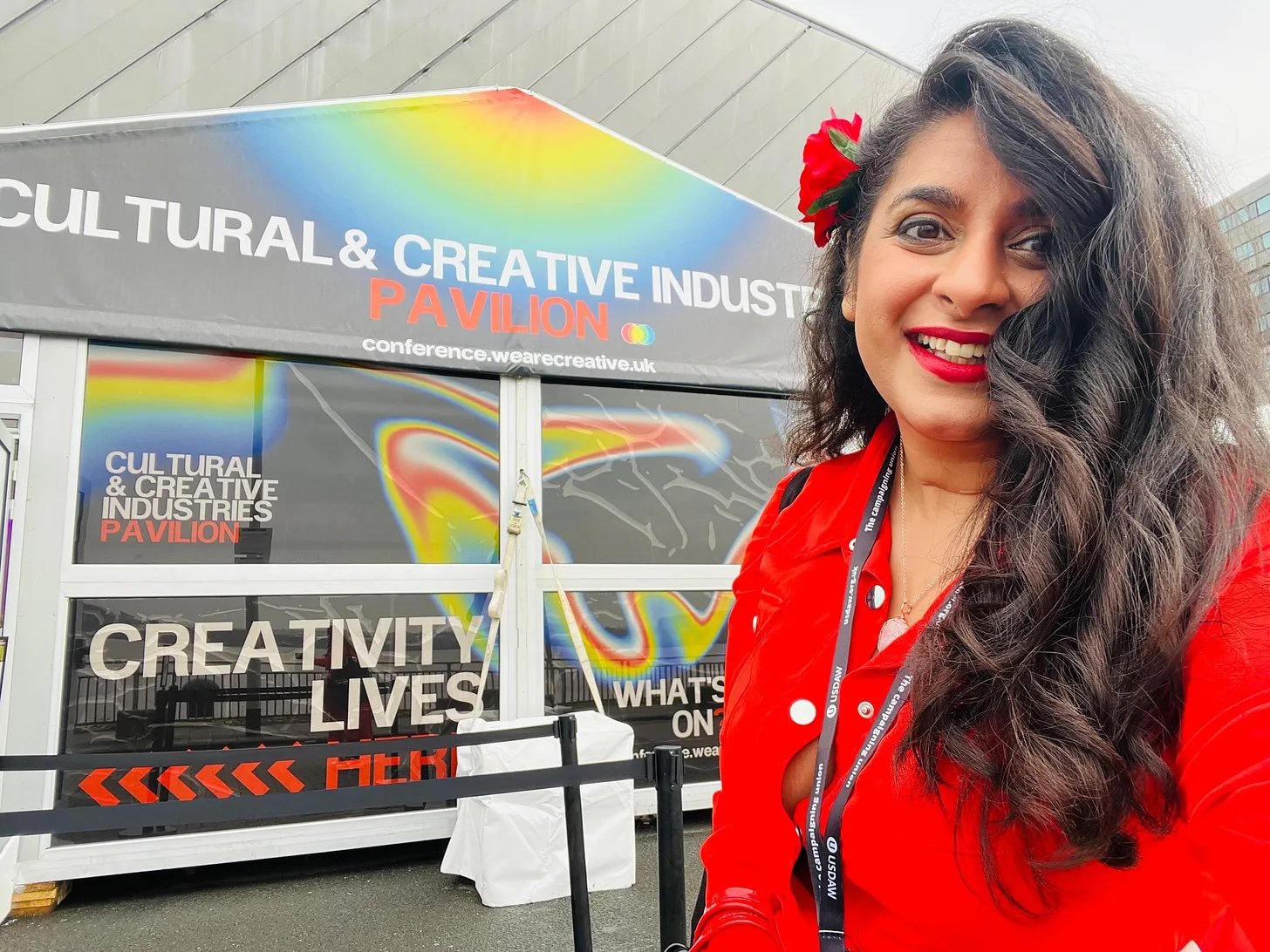Fashion Roundtable at the Labour Party Conference 2024
Words by Michelle Kazi
Image: Fashion Roundtable’s (L-R) Michelle Kazi & Tamara Cincik at Labour Conference 2024 Credit: Michelle Kazi
Attending the Labour Party Conference 2024 in Liverpool marked a pivotal moment for Fashion Roundtable. With Labour now in government, following a historic election victory, this event was a crucial opportunity for us to engage with key political leaders and stakeholders just as major policy shifts begin to take shape. The atmosphere was one of optimism and determination, with a clear focus on reversing years of underinvestment in public services, addressing social inequalities, and advancing policies that promote sustainability and responsible business practices.
The discussions at the conference resonated with Fashion Roundtable’s mission, with topics ranging from ethics and human rights to the intersection of sustainability and artificial intelligence (AI) within the creative industries. In this moment of political renewal, we engaged in soft advocacy, positioning the fashion industry at the heart of policy conversations around inclusive growth, sustainable innovation, and fair working conditions. By attending panels and informal meetings, we were able to explore the evolving role of fashion in a wider socio-economic context, particularly in relation to Labour’s ambitious plans for re-industrialisation, climate justice, and equitable economic growth.
Image: (L-R ) Catherine West MP for Hornsey and Friern Barnet, and Parliamentary Under-Secretary of State for Indo-Pacific since 2024 with Tamara Cincik at Labour Conference 2024 Credit: Tamara Cincik
Labour’s return to power comes at a time when the fashion industry is grappling with unprecedented challenges, including global supply chain disruptions and growing demands for sustainability. These challenges were acknowledged in various speeches, yet the sense of shared responsibility and commitment to positive change left us optimistic. Whether it was the conversation around decarbonisation, local manufacturing, or protecting garment workers' rights, the sense that Labour is ready to act on these issues was palpable.
Keir Starmer’s speech set the tone for a Labour government committed to long-term change and national renewal. He emphasised the need for economic stability and the rebuilding of public services, outlining a vision for a Britain that belongs to working people. His call to restore trust in politics through service and responsibility reflects the values at the core of our work in advocating for a more ethical, inclusive fashion industry.
As we look ahead, Fashion Roundtable remains committed to engaging with Labour’s plans for a greener, fairer economy. The connections we have forged, along with the policy insights we gathered, will be invaluable as we continue to advocate for a responsible, sustainable fashion industry. Our sector can play a significant role in achieving the government’s broader economic and social objectives, and we look forward to supporting these efforts.
Summaries and Takes on the Key Speeches
Keir Starmer – Prime Minister
In his keynote speech, Prime Minister Keir Starmer underscored Labour’s commitment to national renewal and restoring trust in government through a focus on service. Starmer reflected on the party’s historic victory and the significant challenges ahead, particularly in stabilising the economy, rebuilding public services, and addressing societal inequalities. He outlined Labour's ambitious plans, including reindustrialising Britain, fixing the housing crisis, and ensuring economic growth benefits all communities. Starmer’s emphasis on a government of service, not performance, highlighted his vision for long-term change, urging the country to prepare for difficult decisions but promising real, measurable progress in areas like healthcare, infrastructure, and energy.
A key theme of the speech was the recognition of the importance of creativity and access to arts and education for all. Starmer spoke personally about his own experiences with music and the importance of providing all children, regardless of background, access to creative subjects in schools. This emphasis on inclusivity is aligned with Labour's broader vision for levelling up opportunities and restoring arts and culture to their rightful place in education. For Fashion Roundtable, these commitments resonate strongly, offering a timely opportunity to engage on policies that can nurture creative talent and ensure equal access to the arts across the country.
Image: (L-R) Tamara Cincik, Dan Norris MP & West of England Metro Mayor, Michelle Kazi at Labour Conference 2024 Credit: Michelle Kazi
Starmer’s focus on a mission-led government speaks directly to the challenges the fashion industry faces, particularly around sustainability and local production. With policies designed to rebuild industries and create jobs, Fashion Roundtable sees great potential in partnering with this new government to push forward initiatives that support sustainable practices, fair working conditions, and innovation within fashion. The promise of economic growth that benefits all aligns with our goals of making fashion a key contributor to national and regional economic prosperity.
Rachel Reeves – Chancellor of the Exchequer
As the first female Chancellor, Rachel Reeves delivered a powerful speech focused on rebuilding the economy through investment in infrastructure, public services, and business growth. She outlined her vision for a fairer, more inclusive economy, pledging to reform business rates, promote investment, and crack down on wasteful spending. Reeves’ focus on regional growth and industrial strategy has significant implications for the fashion industry, particularly in terms of revitalising UK manufacturing. Fashion Roundtable looks forward to supporting Labour’s economic agenda, ensuring that the fashion sector is a key player in driving sustainable growth and job creation.
Michelle Kazi (Fashion Roundtable Policy Researcher & Content Editor) at the Creative UK Pavillion at Labour Conference 2024 Credit: Michelle Kazi
Lisa Nandy – Secretary of State for Culture, Media, and Sport
Lisa Nandy’s speech was a passionate commitment to rebuilding the UK's cultural sector after what she described as “14 dark, divisive years” of Conservative rule. She announced Labour's plans to put arts, culture, and sports back at the heart of communities, with a particular focus on empowering young people and restoring funding for cultural institutions like libraries and theatres. Nandy’s remarks on expanding access to culture for all, not just the privileged few, directly align with the fashion industry’s goals of inclusivity and accessibility. Fashion Roundtable looks forward to engaging with Labour’s plans for reviving the creative sector and ensuring fashion plays a key role in this cultural renaissance.
Jonathan Reynolds – Secretary of State for Business and Trade
Jonathan Reynolds delivered a speech focused on restoring Britain’s economic strength through a pro-business, pro-worker agenda. He emphasised the need to increase investment, improve productivity, and create high-paying jobs across the UK. His commitment to boosting British industry and supporting small businesses is crucial for the fashion sector, which relies heavily on SMEs and creative entrepreneurs. Reynolds' vision for a partnership between government and industry to rebuild the economy aligns with Fashion Roundtable’s goals of fostering innovation and sustainable growth within the fashion industry.
Image: Tamara Cincik (Fashion Roundtable CEO & Professor of Fashion and Sustainability at BSU) at Labour Conference 2024 Credit: Michelle Kazi
Ed Miliband – Secretary of State for Energy Security and Net Zero
Ed Miliband’s speech focused on Labour’s clean energy revolution, which has already begun to take shape just months into the new government. The removal of barriers to renewable energy projects such as onshore wind and solar power was highlighted as a major victory. His vision for a green economy built on climate justice and social justice resonates strongly with the fashion industry’s shift towards sustainability. Miliband’s commitment to re-industrialising Britain with green jobs, particularly in the energy and manufacturing sectors, offers significant opportunities for the fashion industry to innovate in sustainable production and materials.
Steve Reed – Secretary of State for Environment, Food and Rural Affairs
Steve Reed’s speech underscored Labour’s commitment to protecting the environment, tackling pollution, and restoring nature. His promise to clean up Britain’s rivers and seas, protect biodiversity, and implement a circular economy aligns closely with the fashion industry’s move towards sustainability. Reed’s call for an end to the throwaway culture and investment in recycling infrastructure is particularly relevant to the fashion industry, where the rise of fast fashion has created enormous waste challenges. Fashion Roundtable sees a clear alignment between Labour’s environmental policies and the industry’s efforts to embrace circular models.
Image: (L-R) Tamara Cincik with Andy Burnham, Mayor of Greater Manchester, at Labour Conference 2024 Credit: Tamara Cincik
Words of Reflection:
As I reflect on the Labour Party Conference, the undertones of hope are undeniable. There is a palpable sense of renewal and momentum as Labour steps into government, promising transformative change. The opportunities to engage on critical policy issues, especially around arts in education, the industrial strategy, and the broader role of creative industries, present a unique opening for constructive dialogue. The ambition is there, and so is the promise to bring about economic revival while embedding social justice at its core. It’s a chance for the fashion industry, alongside other sectors, to redefine its place in the UK’s growth story, making creativity central to national renewal.
But, as always, the devil is in the detail. While the energy at conference was inspiring, it remains to be seen how these grand visions will translate into actionable, impactful policies. I approach the next few months with cautious optimism and a willingness to work with and support the new government. There is much at stake, and it will be crucial to ensure that the voices of the creative sectors, including fashion, are not just heard but acted upon. As we continue to engage with policymakers, we must remain vigilant, advocating for the kind of meaningful reforms that can truly deliver on Labour’s promises. It’s a delicate balancing act between hope and realism, but it’s one we must navigate with persistence and precision.






